Dan Levy Has 'Known for a Long Time' How 'Schitt's Creek' Will End
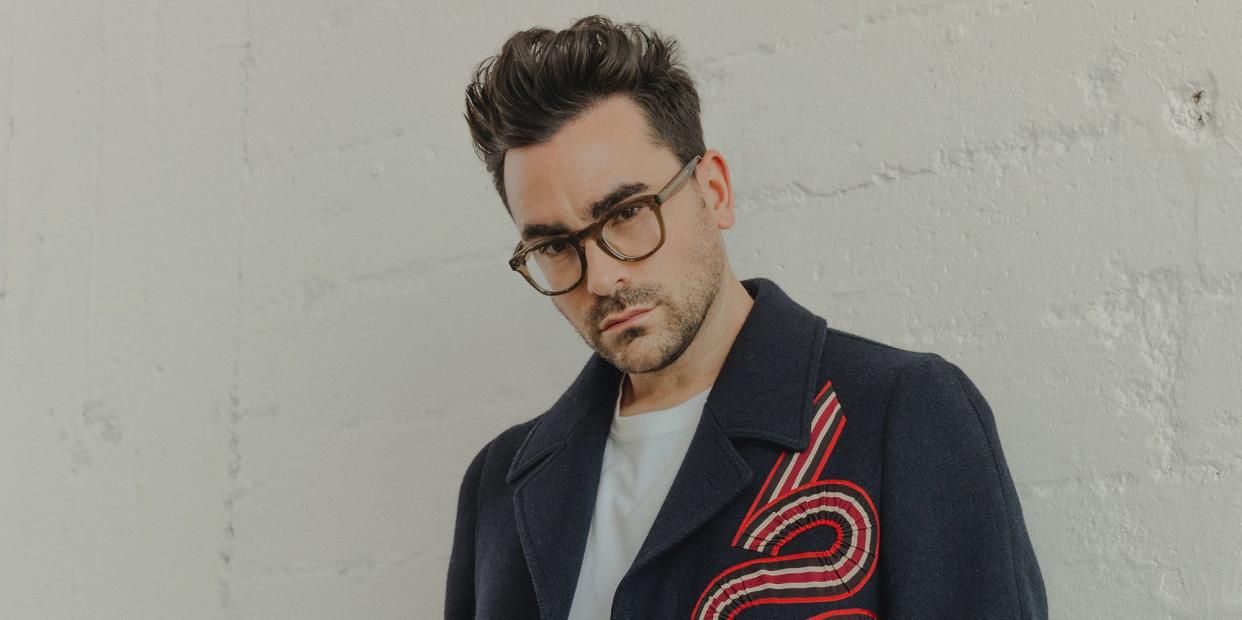
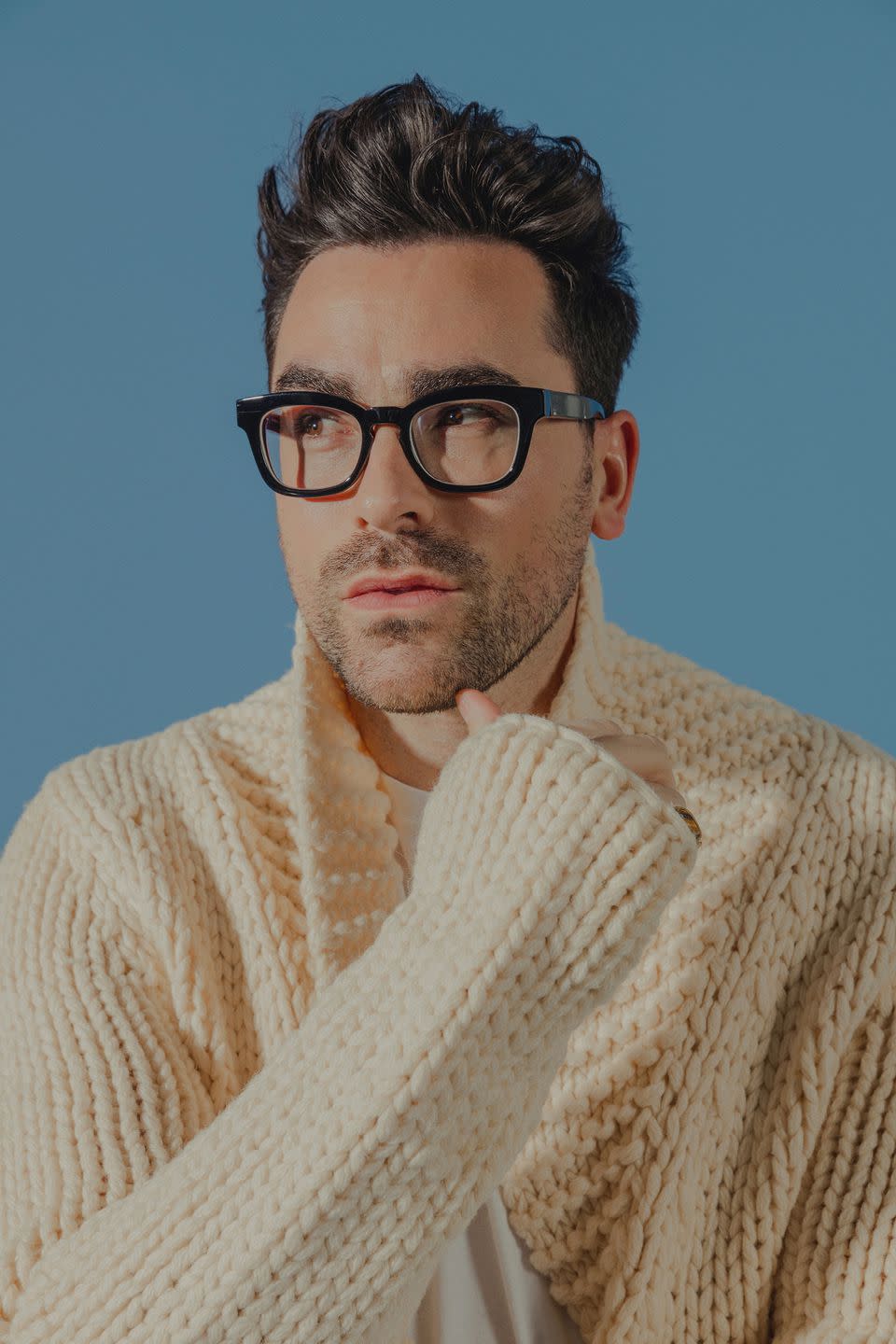
Dan Levy is morbidly afraid of bees. Hates them. He had a terrible run in with one when it went down his sweater during a day of shooting on his breakout Canadian sitcom, Schitt’s Creek. And yet, as he prepares to moderate the first of two sold-out nights of Schitt’s Creek’s Up Close and Personal Tour in February at the Beacon Theatre in New York City, he kind of looks like a bee. Fast and buzzing and sporting thick, dark-rimmed glasses that magnify the size of his eyes. On the chance you catch him standing still, you’d notice a fist-sized bee on his blue cardigan sweater, embroidered across his heart. The sweater choice could be a coincidence, but after spending two hours at lunch with Levy a few days before, it’s hard not to believe it’s on purpose. He likes to face the things that scare him. He has a strategy for overcoming them.
I’m standing in the corner of a tiny green room with the entire cast of Schitt’s Creek. It’s so small that it looks like a miniature motel room-a perfect setting to observe the actors who play a once-wealthy family, now living out of a motel. But while Catherine O’Hara and Eugene Levy’s wife exchange stories, I can’t stop watching the younger Levy. The lifespan of most primetime sitcoms is a lot like a bee’s lifespan-short, frenzied, and fleeting. And whether anyone else in the room knows it yet, this sitcom is nearing its final act; a month later, on March 21, Levy will announce the next season, its sixth, would be its last. Thinking back on our lunch, I almost feel like Levy was hinting at it. “I’m excited for what’s to come, but I also care so deeply about this show, and I think so many times showrunners will set up a show and jump ship to work on something else,” he says. “I couldn’t imagine doing that with this show.”
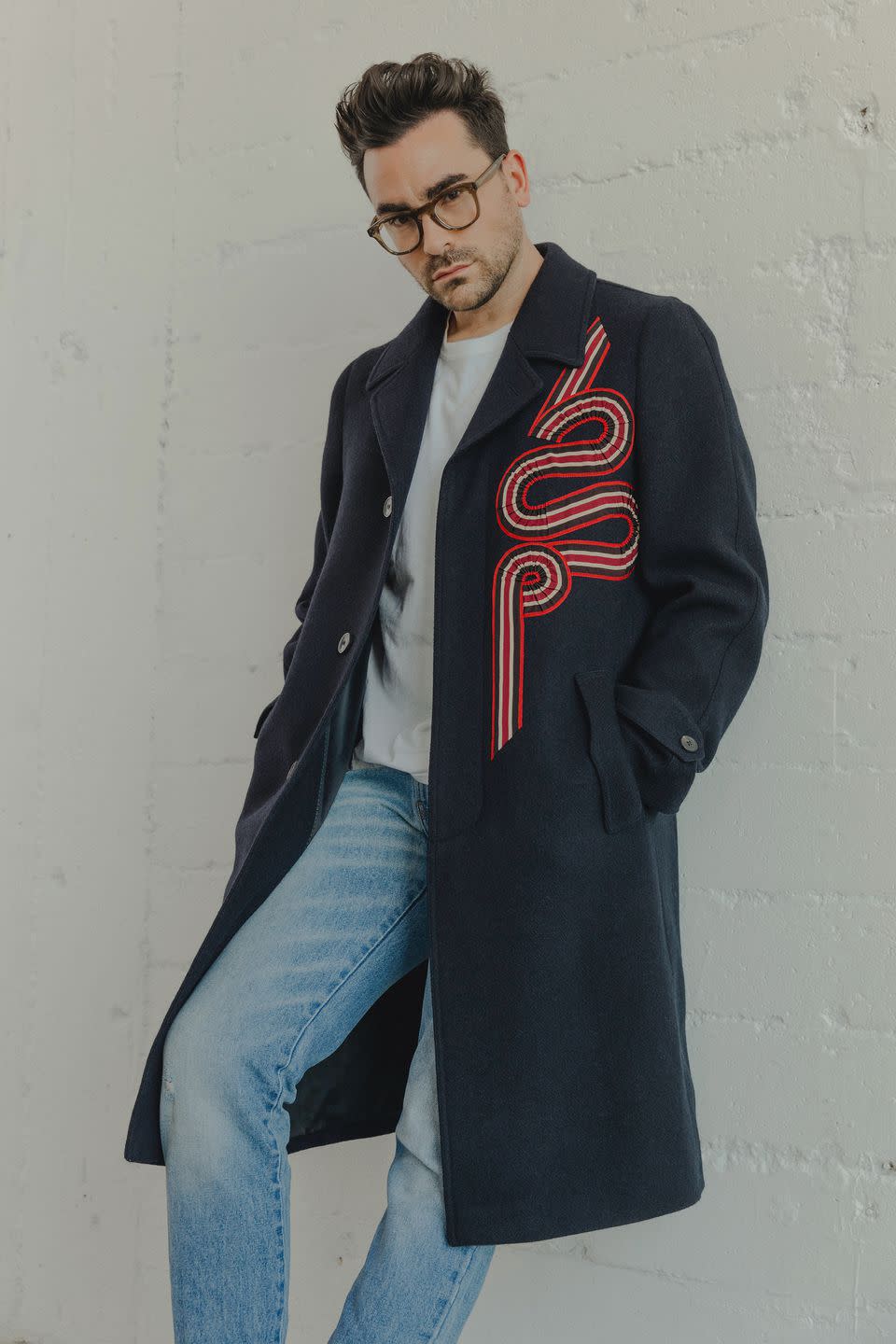
But the reality is that Levy’s greatest creation yet is ending on his own terms. And while 3,000 people are downstairs waiting in feathered hats, screaming “Simply the best!” at nothing in particular, this tour is a way of him introducing himself to the world. They already know David Rose. They love David and Alexis and Johnny and Moira. (God, do they love Moira.) But they don’t know Dan. Not yet. And he’s the one worth knowing. After all, he’s the one who invented this world, and he’ll be the one still around after it’s over.
Of course, the world in question is that of the small town of Schitt’s Creek. The Rose family, fresh from financial ruin, has relocated to the town the family’s patriarch, Johnny, once bought for his son as a joke. Over the course of five seasons, the Rose family has not only adapted to the town and the two room motel-suite they call home, but in a way they’ve thrived. It’s in Schitt’s Creek that they’ve learned to love each other and the people around them-people they never would have interacted with otherwise. And now at the end of Season Five, two of the Roses seem to be settling down in the town, despite the desperate urge to escape a few dozen episodes ago.
The decision to say goodbye to the series is bittersweet. While other shows begin to wane around Season Five, Schitt’s Creek is an anomaly. The series garnered its first Critics Choice nomination in 2018, and its arrival on Netflix has bolstered its fanbase to cult-like status. But like in the opening scene, when the government repossessed most of the Rose family’s possessions, nothing lasts forever-neither wealth nor sitcoms. You pack up what you’ve learned (along with your best wigs), embrace your fear, and move on.
A couple of days before the Beacon Theatre show, Levy meets me for lunch in something a bit more casual: a gray sweatshirt, and the same signature dark-rimmed glasses. He’d been writing something, but he can’t say what. Actually, there’s a few things he can’t talk about when we first sit down. He hints at “A Little Bit Alexis” and big plot points to come as Season Five comes to an end, but the big thing he can’t discuss is the series finale of Schitt’s Creek ahead of its sixth and final season. “I think, in a way, I know how it ends,” Levy says. “I've known for a long time.” But for now, that’s all he’s ready to reveal.
In an era when there’s more television available than one person could ever digest, Levy’s perfectly podunk town managed to break out of the pack. On an emotional level, it’s likely because Schitt’s Creek feeds a craving that’s poorly served on television right now. “There needs to be some kind of correspondence between the clouds that are hanging over us over these past few years and people's desires to find and surround themselves with joy,” Levy says. “I think what sitcoms have provided for people is consistency and a place where they can spend half an hour and just turn off.”
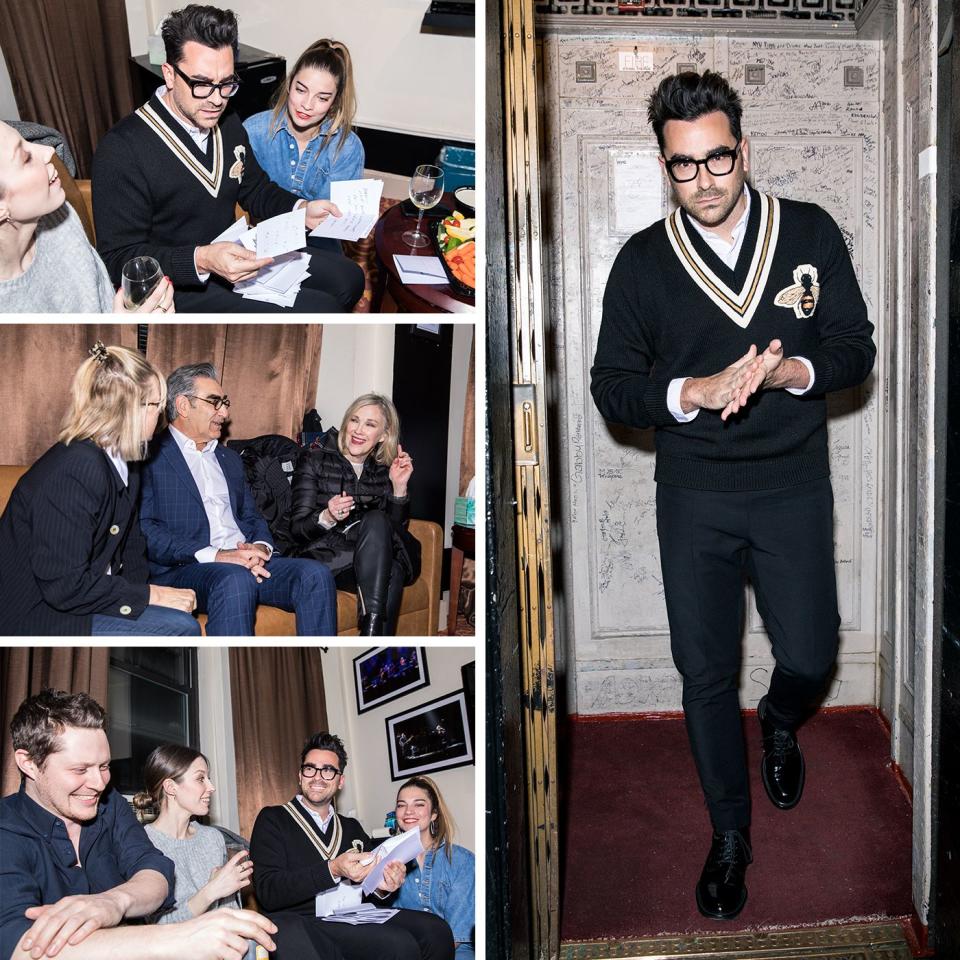
But Levy’s first self-made television project isn’t just a sitcom. It’s also a bit of a perfect storm. In the United States, Schitt’s Creek airs on Pop, a small but stable home for the series. Pop (and its Canadian home on CBC) allows Levy the freedom to create a microcosm in which pansexual David Rose can date and exchange affection with another man and no one bats an eye. It’s idyllic, and it features the kind of gestures that typically aren’t on display on networks like NBC or CBS. Prejudice seemingly doesn’t exist in Schitt’s Creek. “To be able to present a love story that's without fear of consequence was something that I wanted from the very beginning,” Levy says before pausing to collect this thoughts. “Something that I never wanted to compromise on.”
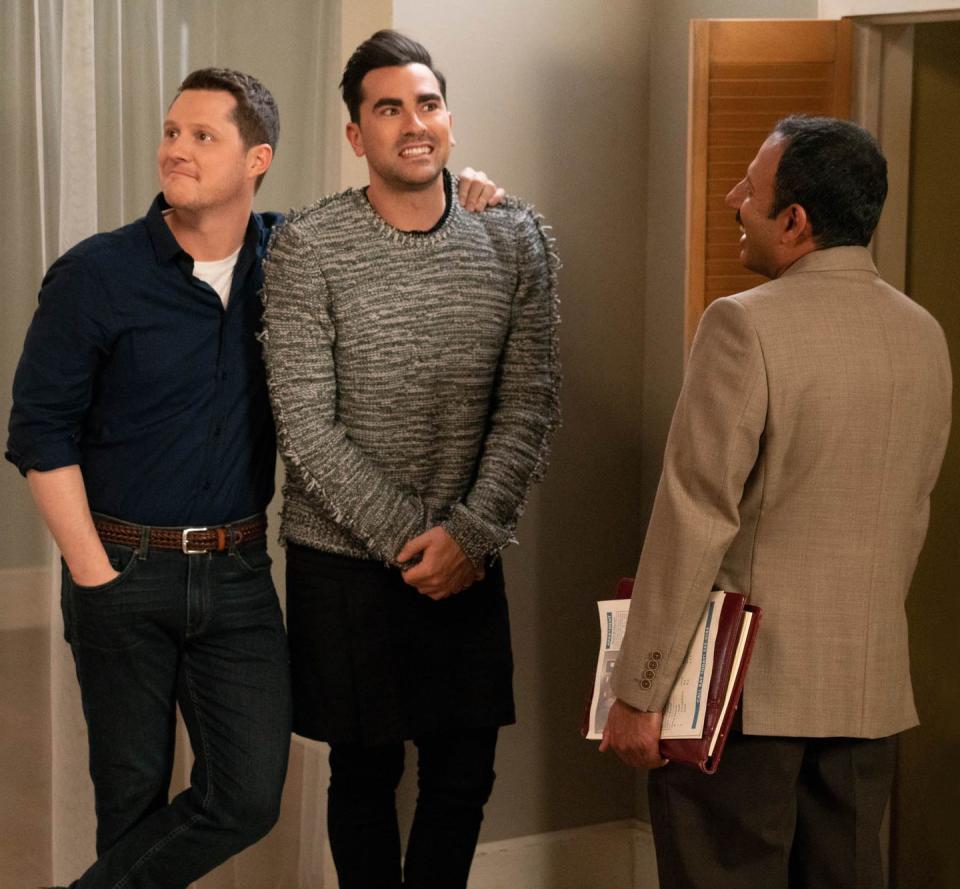
Levy sees Schitt’s Creek as an opportunity to show something on television he didn’t see growing up. “Some of the time, I think bigotry comes from fear of things that people don't see,” he says. “I think as human beings… people don't process fear well.” Levy incorporated people of all types into the landscape of Schitt’s Creek, but instead of approaching it like shows that throw in a token black character or give another character The Gay Storyline, he folded it into the show’s core. He normalized the elephant in the room, and from his vantage point, it’s only been for the best. “Conversations are being created in the home,” Levy says with a smile, “because parents and their [children] are watching this show and loving these characters together.”
The opportunity to do something bigger has always been on Levy’s mind. He’s a theater kid at his core and has no problem working hard, but writing a television show wasn’t particularly how he thought he’d do it. As he grew up, his mother had her cards read three times and told Levy that he was going to find success in writing one day. He wasn’t convinced. “Even when I was at MTV hosting-which I hated, it never felt comfortable,” Levy admits of his time at MTV Canada, first appearing on MTV Live and then on after-shows for series like The Hills and The City. “But it was a job, and I was going to do my best. In the back of my mind I'm thinking, Writing is still not a thing that I would ever do for a living.”
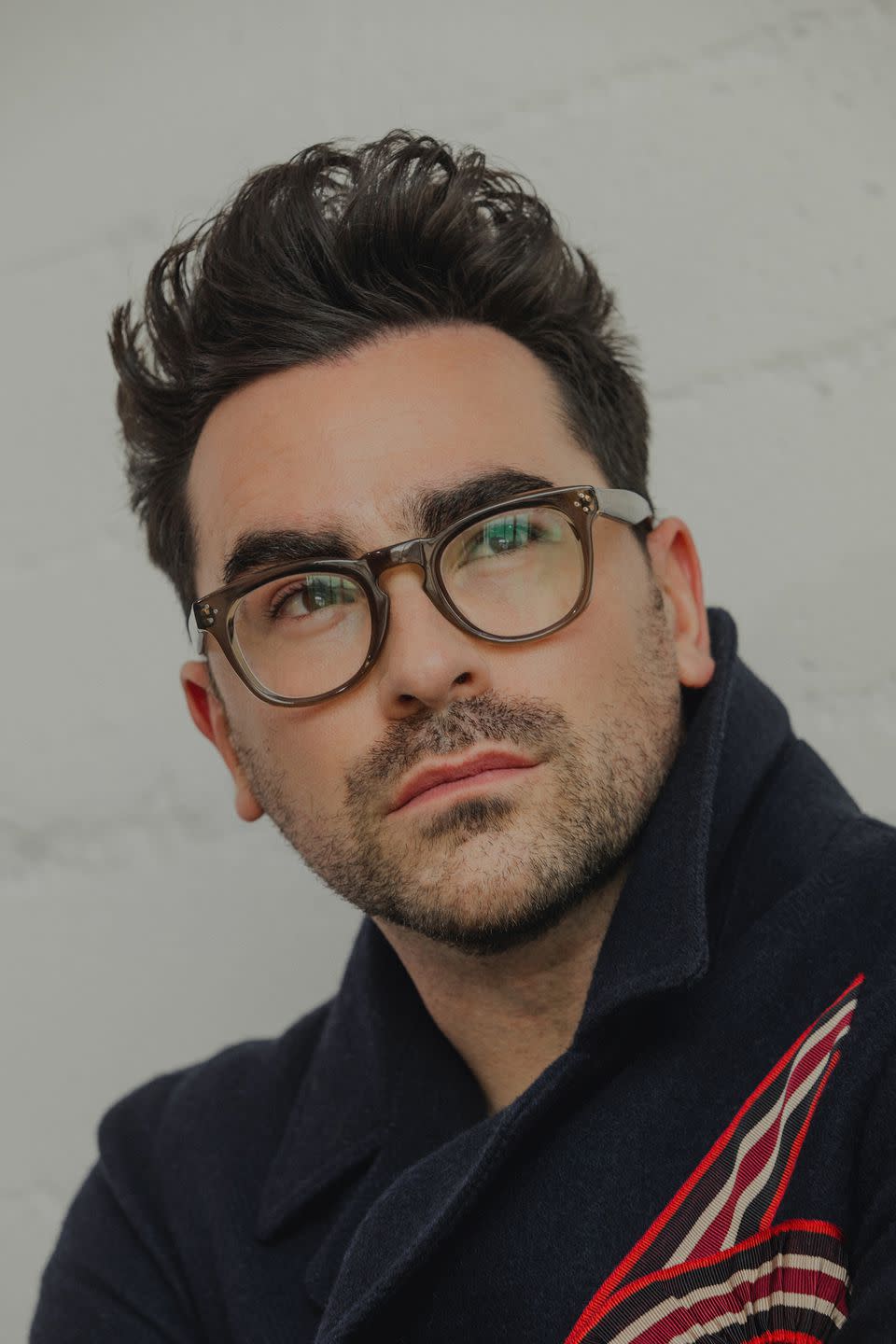
Zoom forward a few years; Levy had left his job at MTV and wasn’t landing any of his auditions. At that point, he was convinced that if hosting wasn’t the right thing (even though it did lead to meeting and interviewing Kelly Clarkson), something else had to be. “I think I've always been someone who has worked really hard at manifesting ideas,” Levy says between bites. “Good and bad. Successful and, you know, not so.” Instead of sticking with the hustle, he changed the rules. “If I'm terrible at auditioning, at least I can write something to my own strengths and try my best at whatever that is.” Turned out he was pretty damn good at that.
That hustling comes in part from having parents who were determined not to let a privileged life go to Levy’s head. His father Eugene is the prolific comedian known for his work on SCTV and a number of Christopher Guest films along with co-star Catherine O’Hara, who plays the Rose family matriarch. But that wasn’t a world in which Levy was ingrained too deeply. While he has anecdotes about growing up with family friends Martin Short and O’Hara nearby, he also recalls his parents dropping him off in front of a GAP Kids at 15-years-old, saying, “Don't come home until you have a job application in your hand.”
Levy took that message to heart. He credits his mom with keeping him and his sister, Sarah, grounded through the years. “I think what my mom's big message through all of that was was, ‘I don't want to take away the joy of earning something yourself.’” That’s why Schitt’s Creek has been so personal to Levy. Sure, he could have ridden his father’s coattails, but the CBC show is ultimately one founded in equal parts determination, love, and necessity. The connection to Eugene and his close friendship to O’Hara is a bonus, but Schitt’s Creek is fully a Levy manifestation.
Eugene says that early on he’d give feedback and even tried his hand at directing. Ultimately, he admits that his son is the lynchpin of the series. “You don’t always get to spend this much time with your adult kids in any other profession,” Eugene says, before pausing in the same fashion his son is prone to. “You see them maybe once a month? Every few weeks? So this is kind of neat. Cherish every moment because one day, it won’t be happening.”
That ending is sooner than fans hoped it would be. As we finish lunch, I suggest that perhaps Schitt’s Creek didn’t have to end, but Dan promptly noted that there is a definitive ending, arguing, “Moira will never fully feel like this is her home.” But that doesn’t mean that everyone is jetting out of Schitt’s Creek in the next season. Though the series finale announcement seems sudden, Dan isn’t the kind of showrunner who is going to make a knee-jerk decision about a series he’s invested so much in: “I stand behind the idea of never taking advantage of the audience you’ve built and putting 110 percent into the show until you’re finished.”
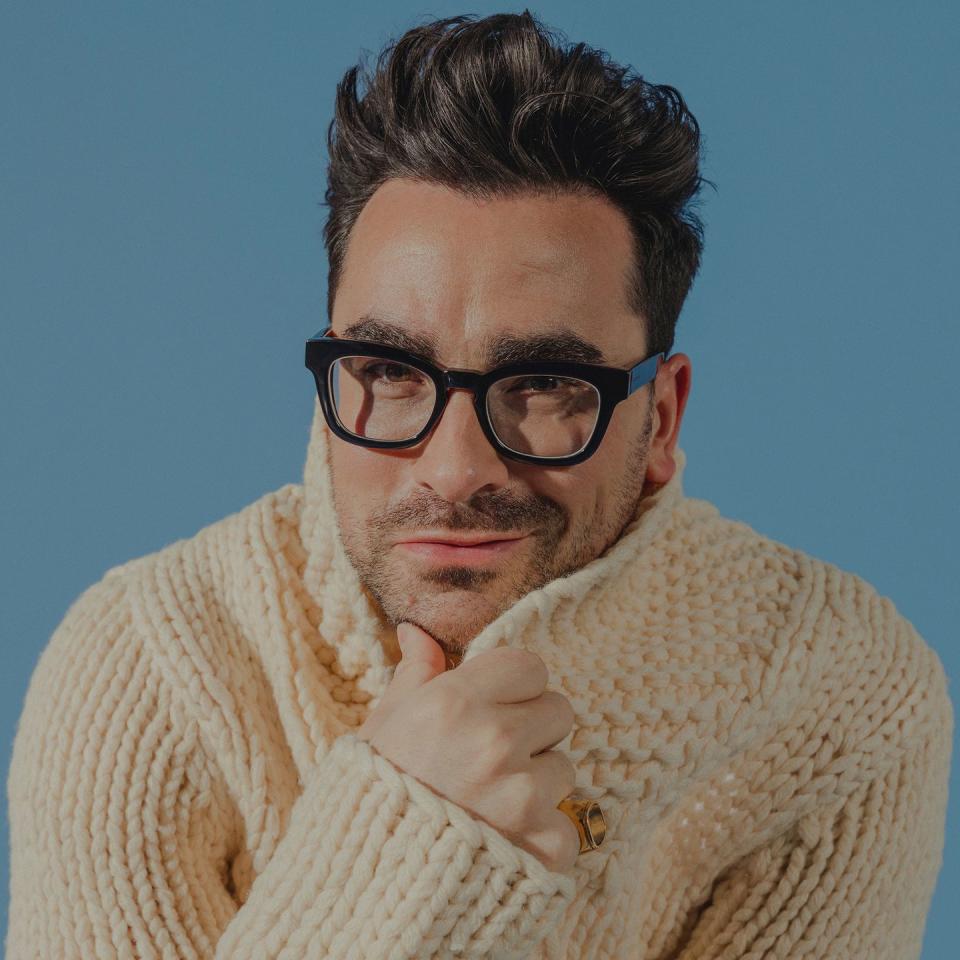
But Levy’s role as showrunner is a taxing one. He touches everything: the scripts, the wardrobe (Jocelyn’s iconic Season Five cat sweaters are made in-house, if you were curious), the final takes. Each season takes about thirteen months to create. “We're editing the show longer than we're shooting the show,” Levy explains. “And it's because every look, every cut, every glance when you're weeding through takes and takes and takes to get the right moment is important.”
And all of those moments are being seen by a lot of people now-a lot more than Levy anticipated when the show started. In 2017, three seasons into the show’s run, Schitt’s Creek landed on Netflix. That helped the reach of the show expand, and an unofficial word-of-mouth campaign commenced. Schitt’s Creek was suddenly the show that you didn’t know you needed to watch. And it feels perfectly timed. As the sociopolitical climate feels more splintered than ever, television viewers are gravitating toward shows that shine a more optimistic light on the world.
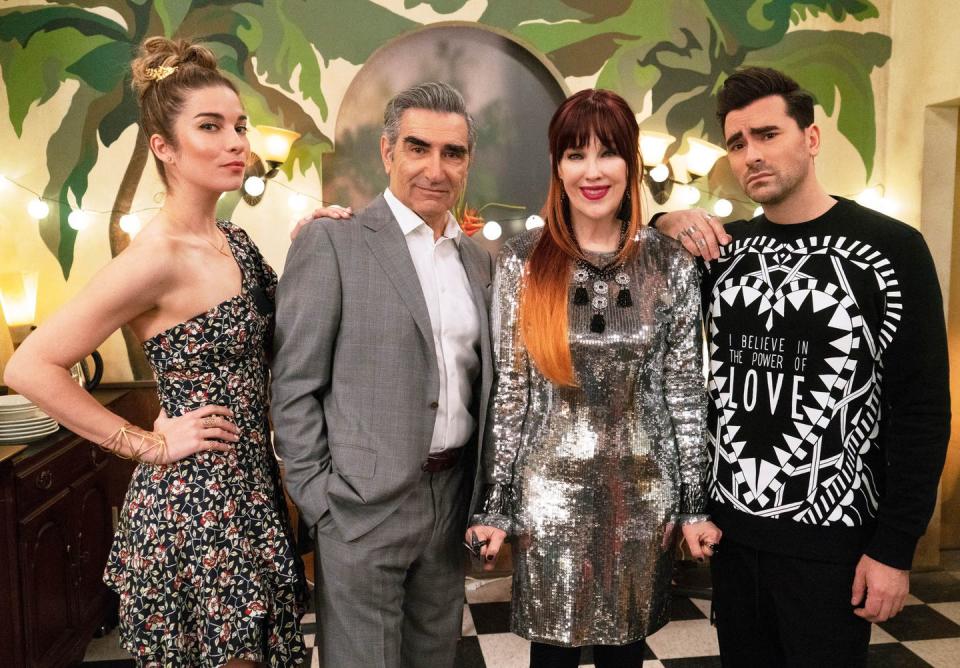
“I felt like there was this wave of comedy that was really mean-spirited for a while,” says Levy. “I never responded to that. It’s a lot more challenging to make well-intentioned comedy.” Over the course of five seasons, Levy has created a world where a wealthy family of four faced their lowest bottom, only to rise and thrive in the small town they once bought as a joke. At the end of this season, Alexis is in a loving relationship and David is engaged to his business partner, and there really is something that feels like the show is coming to a natural conclusion after all. When Levy started this show, the Rose family was barely human. They didn’t understand how the rest of the world worked or what it was like to fear or perhaps even love, but they’ve evolved into something greater over 62 episodes. Something that gives you hope for people around the world who don’t look or think like you.
“The audience has been with these characters now through the ups and down,” Levy explains. “We're now able to let them in and show them the cracks in the veneer. Because we've all pulled through this together.” And that’s a bit what this tour was about. The cast of Schitt’s Creek hit the road to meet fans in person and give them a glimpse of what goes on behind the scenes.
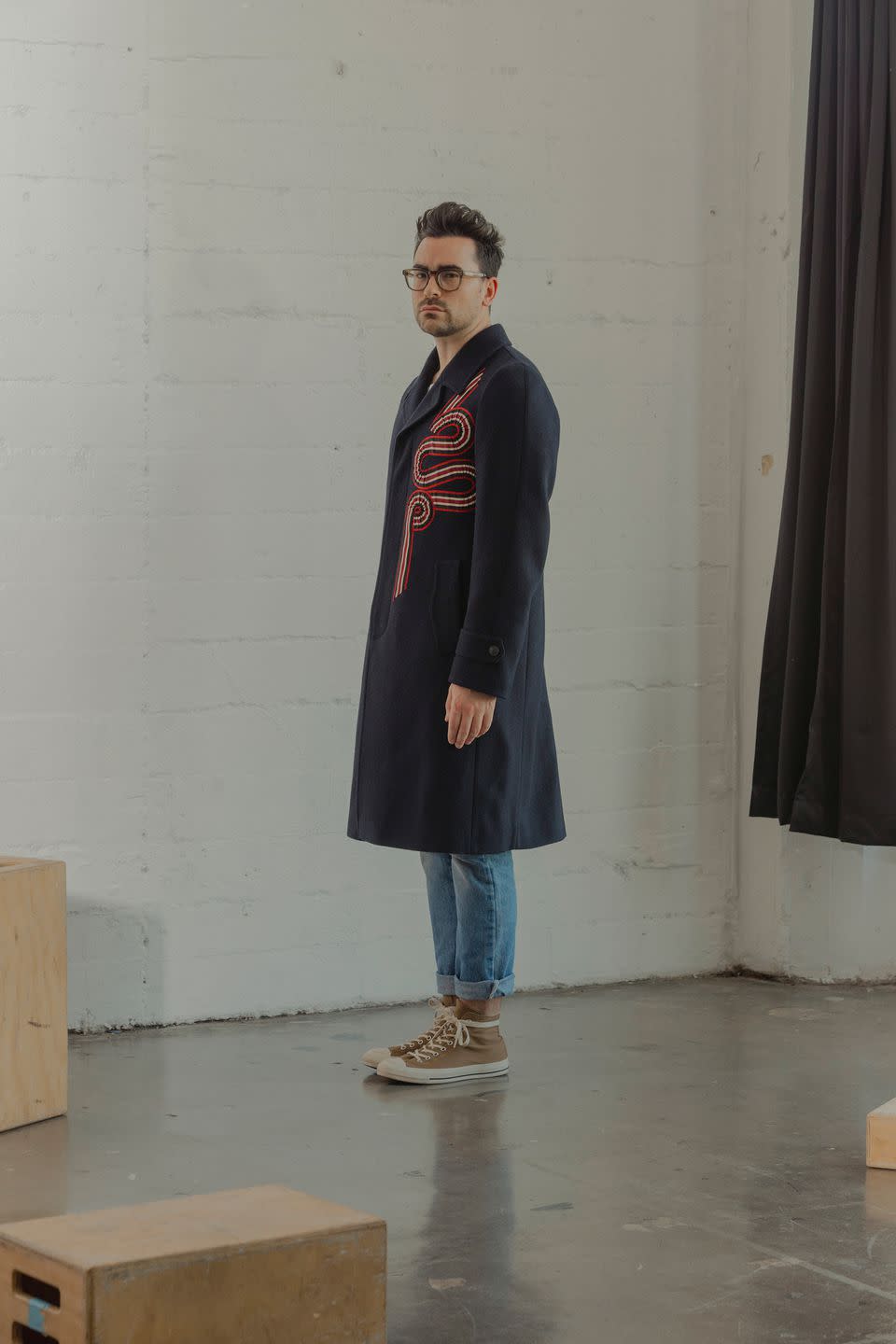
Back upstairs in that tiny green room, Dan appears one more time. This time he notices me in the corner and talks to me a bit about how he hosted a talk a few days before with Amy Sedaris, a hero of his. The way he gets excited while recapping their time together is the core of who he is. It’s contagious. That energy is similar to how each of the cast members speak with one another. It’s the same energy that erupts from the room of 3,000 people when each actor walks out on the stage. The reaction isn’t quite fanaticism or excitement-I would say it’s more complex than that. As cliche as it sounds, I think the best word for it is love. Dan Levy has created a show about love, and it permeates in every facet.
That humanity is what drives the narrative of Schitt’s Creek and the way Levy conducts business on set. Everyone matters, and as long as you’re leading with a bit of humanity, everything will be okay. Fear and sadness and triumphs come and go. And everything that begins eventually has to end. Wearing a bee on your sweater doesn’t mean you’re magically not afraid of bees. It just means that something you love had outweighed the thing you fear. And if you have that, then the fear-the bees and the unknown and the loss of your family fortune-is just a moment in time.
Portraits by Julian Berman, backstage photos by Kat Wirsing
('You Might Also Like',)

